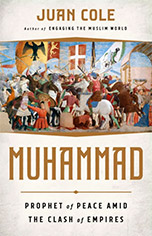The chapter of The Cow in the Qur’an, 2:224, says,
- “Do not render your oaths in God’s name an obstacle to being pious and godfearing, or to making peace among people. Truly God is All-Hearing, Omniscient.”
![]()
As with many Qur’an verses, the exact issue here is not clear, since the Prophet Muhammad recited the Muslim holy book, the Qur’an, in the context of the society of his time–a context that wasn’t always reliably recorded by later generations.
But it seems fairly obvious that Believers in Muhammad’s mission around 623 CE, after they and the Prophet had emigrated to Medina from Mecca under pressure from militant pagans, were excusing themselves from certain moral obligations on the grounds that they had made a vow, in which they had invoked God.
The Qur’an is instructing them that their ethical duty is to principle, not to an arbitrary oath.
And the higher ethical calling is to be a peace-maker among the sometimes fractious clans of the western Arabia city of Medina. The verb for “peace-making” can also mean to do good or to reform, but here since it is followed by the prepositional phrase “among the people,” it sees clear to me that it bears the sense in context of “to make peace.”
I discuss many such passages and incidents in my new book,

Muhammad: Prophet of Peace amid the Clash of Empires, just out
*Now* available for order at Barnes and Noble
And Nicola’s Books in Ann Arbor
And Hachette
And Amazon
The Qur’an is not discounting the power of an oath that contained the name of God. It does, however, seem to say that if the pledge of an individual is getting in the way of peace-making, it should be set aside in favor of working to achieve social harmony.
I’m just speculating here, but it is possible that members of a clan had taken an oath never to work with members of another clan whom they believed to have treated them unfairly. Later Muslim sources, at least, maintain that Medina was full of clan feuds. The Qur’an is prioritizing peace-making above such past vows, even if they were made invoking the name of God himself.
Despite its lack of context in the Qur’an itself, we can conclude from the verse that it places peace-making at the pinnacle of ethical virtues and wants to ensure that lesser obligations never interfere with people making peace.



 © 2026 All Rights Reserved
© 2026 All Rights Reserved